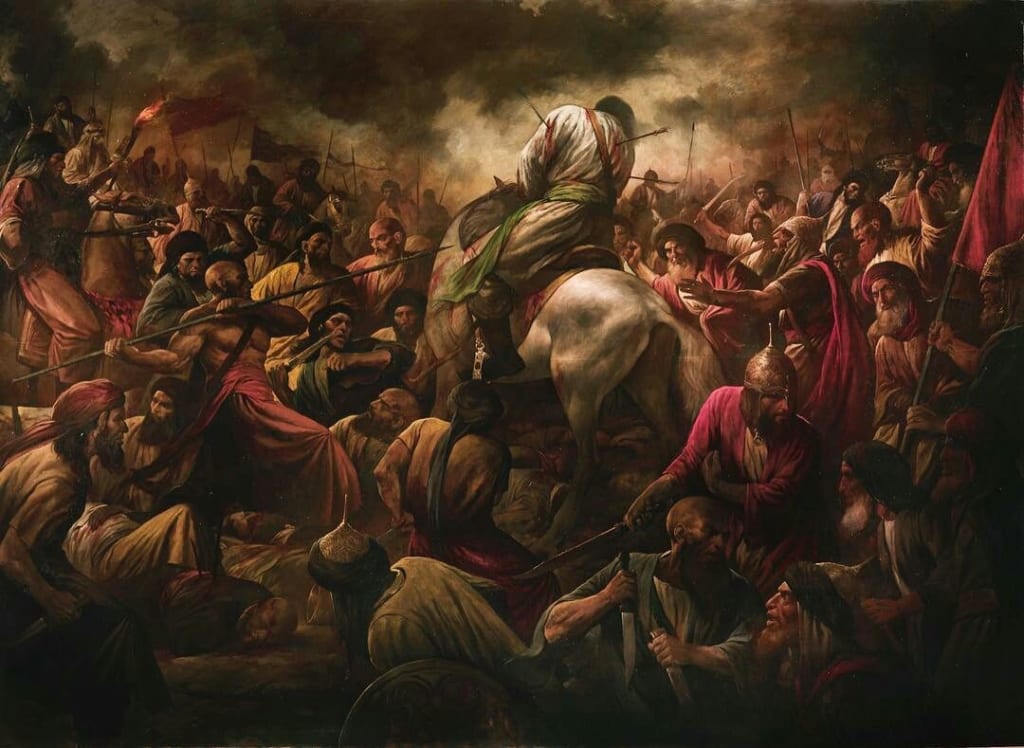Tragedy of Karbala
"A tale of sacrifice and martyrdom that echoes through the ages"

The Tragedy of Karbala is a story that has touched the hearts of Muslims for over 1300 years. It is a story of courage, sacrifice, and martyrdom that has left an indelible mark on the history of Islam. The tragedy occurred on the tenth of Muharram in the year 61 AH (680 AD) in the city of Karbala, which is now located in present-day Iraq.
The story begins with the appointment of Yazid ibn Muawiya as the ruler of the Islamic caliphate. Yazid was known for his cruelty and lack of faith, and his appointment was met with resistance from many Muslims. One of those who opposed Yazid's rule was Imam Hussain, the grandson of the Prophet Muhammad.
Imam Hussain was a revered figure among Muslims, and he enjoyed widespread support from the people. When Yazid demanded that Imam Hussain pledge allegiance to him, Imam Hussain refused, citing the lack of legitimacy of Yazid's rule. Imam Hussain knew that Yazid was a tyrant who would bring nothing but suffering and oppression to the Muslim community. He chose to stand up against Yazid's tyranny, even if it meant sacrificing his own life.
Imam Hussain, along with his family and a small group of followers, embarked on a journey from Medina to Mecca to seek refuge. However, when they reached a place called Karbala, they were intercepted by Yazid's army. The army was led by Umar ibn Sa'ad, a general appointed by Yazid to suppress any opposition to his rule.
Imam Hussain and his followers were vastly outnumbered, with only around 72 men, women, and children against an army of thousands. The army demanded that Imam Hussain pledge allegiance to Yazid, but he refused, stating that he could not pledge allegiance to a tyrant.
What followed was a battle that lasted for three days. Despite being vastly outnumbered, Imam Hussain and his followers fought valiantly against Yazid's army. The battle was intense, with both sides displaying great courage and bravery.
On the third day of the battle, Imam Hussain and his remaining followers were surrounded by Yazid's army. The soldiers cut off the water supply to Imam Hussain's camp, and the women and children were forced to endure extreme thirst and hunger. In the scorching desert heat, Imam Hussain's six-month-old baby, Ali Asghar, cried out for water. Imam Hussain pleaded with the soldiers to give water to his baby, but his request was ignored. Eventually, an arrow struck Ali Asghar in the neck, killing him instantly.
The tragedy of Karbala reached its climax when Imam Hussain was martyred. He was surrounded by Yazid's soldiers, who attacked him with swords and arrows. Despite being wounded, Imam Hussain refused to surrender, and he continued to fight until his last breath. He was brutally killed, and his head was severed from his body.
The remaining men who had fought alongside Imam Hussain were also killed, and their bodies were mutilated and left to rot on the battlefield. The women and children of Imam Hussain's family were taken as captives and were paraded through the streets of Kufa and Damascus.
The Tragedy of Karbala is a story that has been passed down through the generations, and it serves as a reminder of the importance of standing up against injustice and oppression. It is a story of selflessness, bravery, and sacrifice. Imam Hussain and his followers chose to give their lives for the sake of upholding the principles of justice and righteousness.
Today, the Tragedy of Karbala is remembered by millions of Muslims around the world through mourning and remembrance rituals. The tenth day of Muharram, known as Ashura, is observed as a day of mourning and reflection on the tragedy of Karbala. It serves as a reminder to Muslims of the importance of standing up against injustice and oppression, even if it means sacrificing one's own life.






Comments
There are no comments for this story
Be the first to respond and start the conversation.